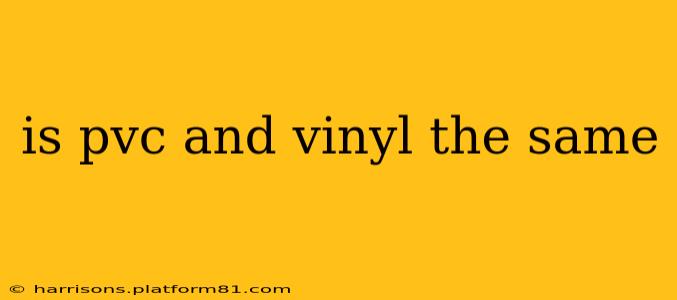The short answer is: yes, PVC is a type of vinyl, but not all vinyl is PVC. This often leads to confusion, so let's delve deeper into the relationship between these two terms.
What is PVC?
PVC stands for polyvinyl chloride. It's a thermoplastic polymer—meaning it can be repeatedly softened by heating and hardened by cooling—made from the polymerization of vinyl chloride monomers. This specific chemical composition gives PVC its unique properties.
What is Vinyl?
"Vinyl" is a more general term referring to a group of materials that are based on polyvinyl compounds. Think of it as a broader category. PVC is just one member of this family. Other vinyl materials might include polyvinylidene chloride (PVDC) or polyvinyl acetate (PVAc). These materials may share similar characteristics but have different chemical compositions and, therefore, different properties.
So, Why the Confusion?
The confusion arises because PVC is so common and widely used that the term "vinyl" is often used interchangeably with "PVC," particularly in everyday conversation. When someone says "vinyl flooring," they almost always mean PVC flooring. This colloquial usage leads to the misconception that the terms are completely synonymous.
What are the key differences in application?
While PVC is the most common type of vinyl, the properties of different vinyl materials vary. This leads to different applications:
- PVC: Known for its durability, flexibility, and resistance to chemicals and water. This makes it ideal for applications such as pipes, flooring, window frames, and siding.
- Other Vinyl Types: These can be softer, more flexible, or have different chemical resistance properties, suitable for uses like adhesives, paints, and certain types of films.
How Can I Tell the Difference?
Unless you're performing a chemical analysis, it's difficult to distinguish between different types of vinyl without specific product information. Most manufacturers will clearly state the material composition on product labels or specification sheets. If you're unsure, look for the abbreviation "PVC" to confirm that the material is indeed polyvinyl chloride.
Why is this important?
Understanding the distinction is important for several reasons:
- Choosing the right material: Different vinyl types have varying properties, and knowing the specific type is crucial for selecting the appropriate material for a particular application.
- Environmental concerns: The manufacturing and disposal of PVC can have environmental impacts, so knowing whether a product is PVC helps consumers make informed choices based on their environmental concerns.
- Health concerns: While PVC is generally considered safe, there are ongoing discussions regarding its potential health impacts. Understanding the exact composition of the vinyl product allows for a more thorough examination of potential risks.
In summary, while "vinyl" is a broader category, PVC is a specific type of vinyl commonly used in numerous applications. Context is key; the term "vinyl" often implies PVC in everyday usage, but this isn't always technically correct. Checking product labels for specific material information remains the best way to be sure.
